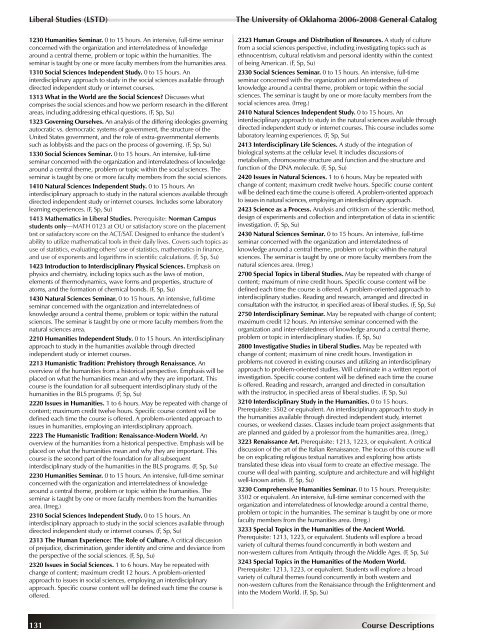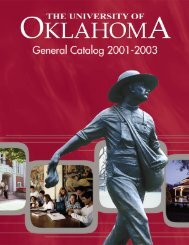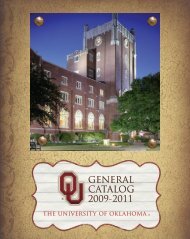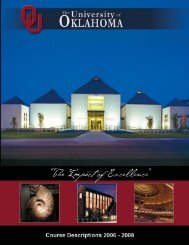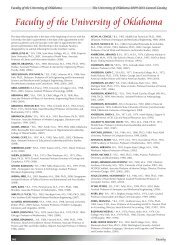2006-08 Course Descriptions - Catalog - University of Oklahoma
2006-08 Course Descriptions - Catalog - University of Oklahoma
2006-08 Course Descriptions - Catalog - University of Oklahoma
Create successful ePaper yourself
Turn your PDF publications into a flip-book with our unique Google optimized e-Paper software.
Liberal Studies (LSTD)The Uni ver sity <strong>of</strong> <strong>Oklahoma</strong> <strong>2006</strong>-20<strong>08</strong> Gen eral Cat a log1230 Humanities Seminar. 0 to 15 hours. An intensive, full-time seminarconcerned with the organization and interrelatedness <strong>of</strong> knowledgearound a central theme, problem or topic within the humanities. Theseminar is taught by one or more faculty members from the humanities area.1310 Social Sciences Independent Study. 0 to 15 hours. Aninterdisciplinary approach to study in the social sciences available throughdirected independent study or internet courses.1313 What in the World are the Social Sciences? Discusses whatcomprises the social sciences and how we perform research in the differentareas, including addressing ethical questions. (F, Sp, Su)1323 Governing Ourselves. An analysis <strong>of</strong> the differing ideologies governingautocratic vs. democratic systems <strong>of</strong> government, the structure <strong>of</strong> theUnited States government, and the role <strong>of</strong> extra-governmental elementssuch as lobbyists and the pacs on the process <strong>of</strong> governing. (F, Sp, Su)1330 Social Sciences Seminar. 0 to 15 hours. An intensive, full-timeseminar concerned with the organization and interrelatedness <strong>of</strong> knowledgearound a central theme, problem or topic within the social sciences. Theseminar is taught by one or more faculty members from the social sciences.1410 Natural Sciences Independent Study. 0 to 15 hours. Aninterdisciplinary approach to study in the natural sciences available throughdirected independent study or internet courses. Includes some laboratorylearning experiences. (F, Sp, Su)1413 Mathematics in Liberal Studies. Prerequisite: Norman Campusstudents only—MATH 0123 at OU or satisfactory score on the placementtest or satisfactory score on the ACT/SAT. Designed to enhance the student’sability to utilize mathematical tools in their daily lives. Covers such topics asuse <strong>of</strong> statistics, evaluating others’ use <strong>of</strong> statistics, mathematics in finance,and use <strong>of</strong> exponents and logarithms in scientific calculations. (F, Sp, Su)1423 Introduction to Interdisciplinary Physical Sciences. Emphasis onphysics and chemistry, including topics such as the laws <strong>of</strong> motion,elements <strong>of</strong> thermodynamics, wave forms and properties, structure <strong>of</strong>atoms, and the formation <strong>of</strong> chemical bonds. (F, Sp, Su)1430 Natural Sciences Seminar. 0 to 15 hours. An intensive, full-timeseminar concerned with the organization and interrelatedness <strong>of</strong>knowledge around a central theme, problem or topic within the naturalsciences. The seminar is taught by one or more faculty members from thenatural sciences area.2210 Humanities Independent Study. 0 to 15 hours. An interdisciplinaryapproach to study in the humanities available through directedindependent study or internet courses.2213 Humanistic Tradition: Prehistory through Renaissance. Anoverview <strong>of</strong> the humanities from a historical perspective. Emphasis will beplaced on what the humanities mean and why they are important. Thiscourse is the foundation for all subsequent interdisciplinary study <strong>of</strong> thehumanities in the BLS programs. (F, Sp, Su)2220 Issues in Humanities. 1 to 6 hours. May be repeated with change <strong>of</strong>content; maximum credit twelve hours. Specific course content will bedefined each time the course is <strong>of</strong>fered. A problem-oriented approach toissues in humanities, employing an interdisciplinary approach.2223 The Humanistic Tradition: Renaissance-Modern World. Anoverview <strong>of</strong> the humanities from a historical perspective. Emphasis will beplaced on what the humanities mean and why they are important. Thiscourse is the second part <strong>of</strong> the foundation for all subsequentinterdisciplinary study <strong>of</strong> the humanities in the BLS programs. (F, Sp, Su)2230 Humanities Seminar. 0 to 15 hours. An intensive, full-time seminarconcerned with the organization and interrelatedness <strong>of</strong> knowledgearound a central theme, problem or topic within the humanities. Theseminar is taught by one or more faculty members from the humanitiesarea. (Irreg.)2310 Social Sciences Independent Study. 0 to 15 hours. Aninterdisciplinary approach to study in the social sciences available throughdirected independent study or internet courses. (F, Sp, Su)2313 The Human Experience: The Role <strong>of</strong> Culture. A critical discussion<strong>of</strong> prejudice, discrimination, gender identity and crime and deviance fromthe perspective <strong>of</strong> the social sciences. (F, Sp, Su)2320 Issues in Social Sciences. 1 to 6 hours. May be repeated withchange <strong>of</strong> content; maximum credit 12 hours. A problem-orientedapproach to issues in social sciences, employing an interdisciplinaryapproach. Specific course content will be defined each time the course is<strong>of</strong>fered.2323 Human Groups and Distribution <strong>of</strong> Resources. A study <strong>of</strong> culturefrom a social sciences perspective, including investigating topics such asethnocentrism, cultural relativism and personal identity within the context<strong>of</strong> being American. (F, Sp, Su)2330 Social Sciences Seminar. 0 to 15 hours. An intensive, full-timeseminar concerned with the organization and interrelatedness <strong>of</strong>knowledge around a central theme, problem or topic within the socialsciences. The seminar is taught by one or more faculty members from thesocial sciences area. (Irreg.)2410 Natural Sciences Independent Study. 0 to 15 hours. Aninterdisciplinary approach to study in the natural sciences available throughdirected independent study or internet courses. This course includes somelaboratory learning experiences. (F, Sp, Su)2413 Interdisciplinary Life Sciences. A study <strong>of</strong> the integration <strong>of</strong>biological systems at the cellular level. It includes discussions <strong>of</strong>metabolism, chromosome structure and function and the structure andfunction <strong>of</strong> the DNA molecule. (F, Sp, Su)2420 Issues in Natural Sciences. 1 to 6 hours. May be repeated withchange <strong>of</strong> content; maximum credit twelve hours. Specific course contentwill be defined each time the course is <strong>of</strong>fered. A problem-oriented approachto issues in natural sciences, employing an interdisciplinary approach.2423 Science as a Process. Analysis and criticism <strong>of</strong> the scientific method,design <strong>of</strong> experiments and collection and interpretation <strong>of</strong> data in scientificinvestigation. (F, Sp, Su)2430 Natural Sciences Seminar. 0 to 15 hours. An intensive, full-timeseminar concerned with the organization and interrelatedness <strong>of</strong>knowledge around a central theme, problem or topic within the naturalsciences. The seminar is taught by one or more faculty members from thenatural sciences area. (Irreg.)2700 Special Topics in Liberal Studies. May be repeated with change <strong>of</strong>content; maximum <strong>of</strong> nine credit hours. Specific course content will bedefined each time the course is <strong>of</strong>fered. A problem-oriented approach tointerdisciplinary studies. Reading and research, arranged and directed inconsultation with the instructor, in specified areas <strong>of</strong> liberal studies. (F, Sp, Su)2750 Interdisciplinary Seminar. May be repeated with change <strong>of</strong> content;maximum credit 12 hours. An intensive seminar concerned with theorganization and inter-relatedness <strong>of</strong> knowledge around a central theme,problem or topic in interdisciplinary studies. (F, Sp, Su)2800 Investigative Studies in Liberal Studies. May be repeated withchange <strong>of</strong> content; maximum <strong>of</strong> nine credit hours. Investigation inproblems not covered in existing courses and utilizing an interdisciplinaryapproach to problem-oriented studies. Will culminate in a written report <strong>of</strong>investigation. Specific course content will be defined each time the courseis <strong>of</strong>fered. Reading and research, arranged and directed in consultationwith the instructor, in specified areas <strong>of</strong> liberal studies. (F, Sp, Su)3210 Interdisciplinary Study in the Humanities. 0 to 15 hours.Prerequisite: 3502 or equivalent. An interdisciplinary approach to study inthe humanities available through directed independent study, internetcourses, or weekend classes. Classes include team project assignments thatare planned and guided by a pr<strong>of</strong>essor from the humanities area. (Irreg.)3223 Renaissance Art. Prerequisite: 1213, 1223, or equivalent. A criticaldiscussion <strong>of</strong> the art <strong>of</strong> the Italian Renaissance. The focus <strong>of</strong> this course willbe on explicating religious textual narratives and exploring how artiststranslated these ideas into visual form to create an effective message. Thecourse will deal with painting, sculpture and architecture and will highlightwell-known artists. (F, Sp, Su)3230 Comprehensive Humanities Seminar. 0 to 15 hours. Prerequisite:3502 or equivalent. An intensive, full-time seminar concerned with theorganization and interrelatedness <strong>of</strong> knowledge around a central theme,problem or topic in the humanities. The seminar is taught by one or morefaculty members from the humanities area. (Irreg.)3233 Special Topics in the Humanities <strong>of</strong> the Ancient World.Prerequisite: 1213, 1223, or equivalent. Students will explore a broadvariety <strong>of</strong> cultural themes found concurrently in both western andnon-western cultures from Antiquity through the Middle Ages. (F, Sp, Su)3243 Special Topics in the Humanities <strong>of</strong> the Modern World.Prerequisite: 1213, 1223, or equivalent. Students will explore a broadvariety <strong>of</strong> cultural themes found concurrently in both western andnon-western cultures from the Renaissance through the Enlightenment andinto the Modern World. (F, Sp, Su)131 <strong>Course</strong> <strong>Descriptions</strong>


